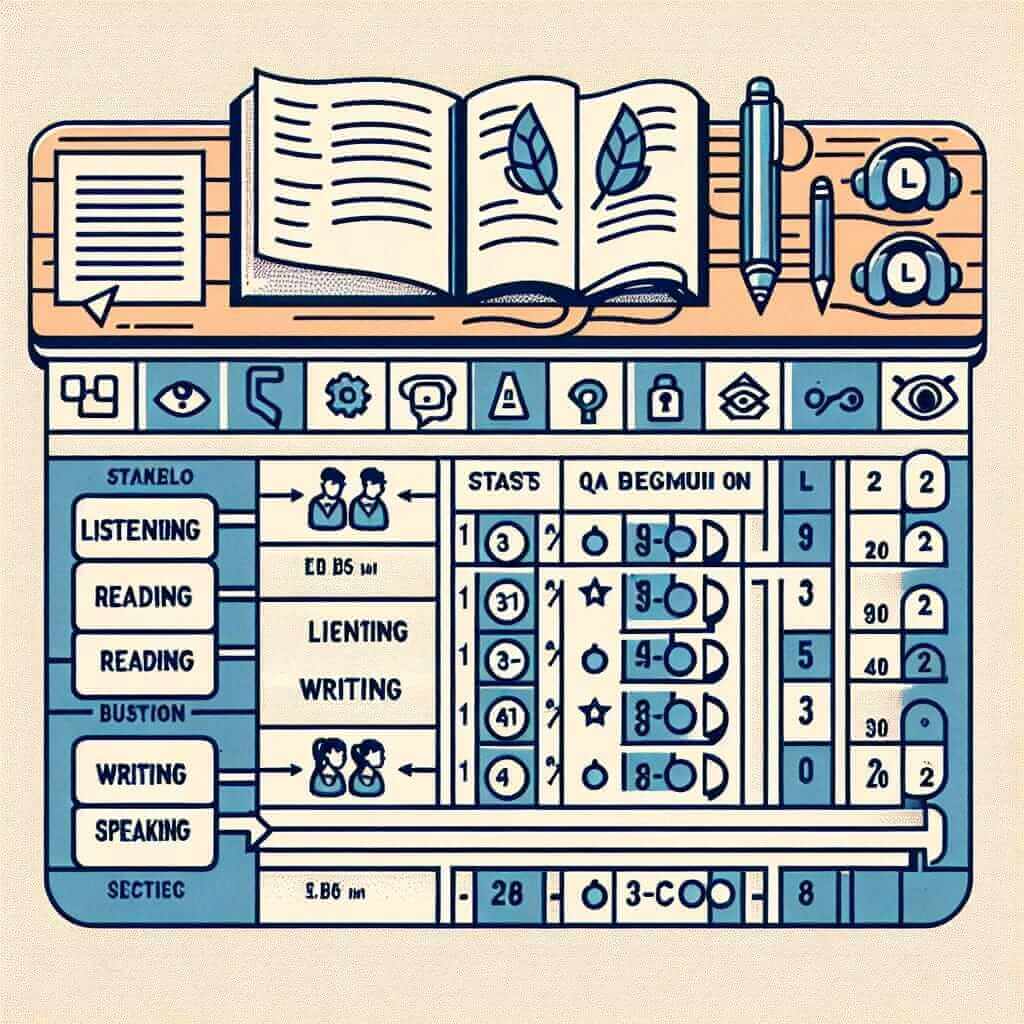The IELTS GT (General Training) test is designed for individuals who want to migrate to an English-speaking country or apply for work experience or training programs. Understanding the test format is crucial for achieving your desired band score. This article provides a comprehensive guide to the IELTS GT test format, complete with examples, tips, and strategies to help you succeed.
IELTS GT Test Format: An Overview
The IELTS GT test assesses your English language proficiency across four modules: Listening, Reading, Writing, and Speaking. Let’s break down each module:
1. Listening
- Duration: 30 minutes (plus 10 minutes to transfer answers)
- Number of Sections: 4 sections
- Number of Questions: 40 questions
The Listening test is the same for both IELTS Academic and General Training. You will listen to four recordings of native English speakers and answer various question types, such as:
- Multiple Choice
- Matching
- Sentence Completion
- Form/Note/Table/Flow-chart Completion
- Short-answer Questions
Example:
You might hear a conversation about booking a hotel room and be asked to choose the correct room type from a list.
2. Reading
- Duration: 60 minutes
- Number of Sections: 3 sections
- Number of Texts: 3-4 texts
- Number of Questions: 40 questions
The Reading test for IELTS GT differs from the Academic test in terms of text selection. You will encounter texts related to everyday life, work, and general interest topics. The question types are similar to the Listening test.
Example:
You might read a job advertisement and answer questions about the required qualifications and responsibilities.
3. Writing
- Duration: 60 minutes
- Number of Tasks: 2 tasks
Task 1: Letter Writing (150 words minimum)
You will be presented with a situation and asked to write a letter. This could be a personal, semi-formal, or formal letter.
Example:
Write a letter to your landlord requesting repairs in your apartment.
Sample Band 8 Letter:
Dear Mr. Smith,
I am writing to request some repairs to my apartment at [Your Address]. Since moving in on [Move-in Date], I have noticed a few issues that require attention.
Firstly, the faucet in the kitchen sink is leaking, resulting in water wastage and potential damage to the cabinet below. Secondly, the bathroom light fixture is flickering and needs replacement. Finally, the window in the living room doesn’t close properly, causing a draft.
I would greatly appreciate it if you could arrange for these repairs to be carried out at your earliest convenience. Please let me know when I can expect someone to come and address these issues.
Thank you for your time and attention to this matter.
Sincerely,
[Your Name]
Task 2: Essay Writing (250 words minimum)
You will be given a point of view, argument, or problem and asked to write an essay in response.
Example:
Some people believe that the government should provide free healthcare for all citizens, while others think that individuals should be responsible for their own healthcare costs. Discuss both views and give your own opinion.
Sample Band 8 Essay:
The provision of healthcare is a complex issue that sparks considerable debate worldwide. While some advocate for universal healthcare funded by the government, others believe in individual responsibility for medical expenses. This essay will delve into both perspectives before presenting a balanced viewpoint.
Proponents of universal healthcare argue that it ensures equal access to medical treatment, regardless of socioeconomic status. By removing financial barriers, preventive care is encouraged, potentially reducing the burden on healthcare systems in the long run. Moreover, it promotes social solidarity by ensuring everyone contributes to the well-being of all citizens.
Conversely, critics argue that government-funded healthcare leads to longer wait times and reduced quality of care due to increased demand and limited resources. They believe that individuals should be responsible for their own health choices and bear the associated costs. This, they argue, promotes personal responsibility and allows individuals greater control over their healthcare decisions.
In conclusion, both sides of the argument present valid points. While universal healthcare fosters equality and accessibility, individual responsibility encourages personal accountability and potentially enhances efficiency. Ultimately, a balanced approach that combines government support with individual contributions might prove most effective in ensuring a sustainable and equitable healthcare system.
4. Speaking
- Duration: 11-14 minutes
- Number of Parts: 3 parts
The Speaking test is a face-to-face interview with a certified examiner.
- Part 1: Introduction and Interview (4-5 minutes): You will answer general questions about yourself, your interests, and familiar topics.
- Part 2: Individual Long Turn (3-4 minutes): You will receive a cue card with a topic and speak for 1-2 minutes. You will have 1 minute to prepare.
- Part 3: Two-way Discussion (4-5 minutes): You will engage in a discussion with the examiner related to the topic from Part 2.

Common Mistakes to Avoid
- Not managing time effectively: Allocate time wisely for each section and question.
- Ignoring instructions: Carefully read and follow all instructions provided.
- Copying directly from the text: Paraphrase information and use your own words.
- Memorizing answers: Focus on understanding concepts and expressing yourself naturally.
Tips for Success
- Practice regularly: Familiarize yourself with the test format and question types.
- Improve your vocabulary: Expand your vocabulary range to express yourself effectively.
- Focus on fluency and coherence: Speak clearly and connect your ideas logically.
- Seek feedback: Get feedback on your performance from experienced teachers or tutors.
Conclusion
Thoroughly understanding the IELTS GT test format is essential for success. By following the tips and strategies outlined in this article, you can approach the test with confidence and achieve your desired band score. Remember to practice consistently, familiarize yourself with the question types, and seek feedback to identify areas for improvement.